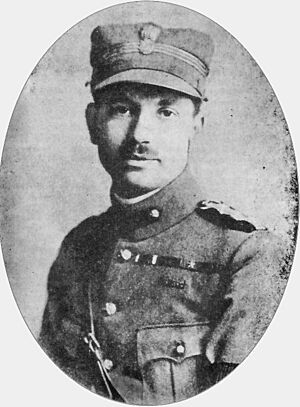National and Social Liberation facts for kids
Quick facts for kids National and Social LiberationΕθνική και Κοινωνική Απελευθέρωσις Ethniki kai Koinoniki Apeleftherosis |
|
|---|---|
| Participant in the Greek Resistance | |
| Active | 1942–1944 |
| Ideology | Republicanism Liberalism Venizelism Anti-communism Anti-fascism Anti-monarchism |
| Leaders | Georgios Kartalis Dimitrios Psarros |
| Area of operations | Epirus, Central Greece |
| Allies | EDES PEAN SOE Greek government in exile |
| Opponents | Royal Italian Army German Army Collaborationist government (Security Battalions) EAM/ELAS (after 1943) |
National and Social Liberation (often called EKKA) was a group of brave Greeks who fought against the Axis powers (like Germany and Italy) during World War II. It was a part of the larger Greek Resistance movement. EKKA was started in late 1942 by a military leader named Colonel Dimitrios Psarros and a political leader named Georgios Kartalis. They wanted to free Greece from occupation and create a better country after the war.
Contents
The Fight for Freedom: EKKA's Story

EKKA was founded by Colonel Psarros, Georgios Kartalis, and other officers like Dimitrios Karachristos and Dimitrios Georgantas. Their main goals were clear:
- To fight against the German and Italian forces occupying Greece.
- To work towards a republic (a country led by elected officials, not a king) after Greece was free.
- To bring about positive social changes for everyone.
The 5/42 Evzone Regiment
EKKA's fighting force was called the 5/42 Evzone Regiment. It was formed in early 1943 and named after Colonel Psarros's old army unit. At its strongest, the regiment had about 1,000 fighters. They were mostly active in an area called Central Greece, especially around Phocis.
However, EKKA faced challenges not only from the Axis powers but also from other Greek resistance groups. The largest group was the Greek People's Liberation Army (ELAS), which was led by communists. ELAS believed they should lead the entire resistance movement. They saw EKKA as a group that supported old ways and was too friendly with the British.
ELAS forces attacked the 5/42 Evzones Regiment in May and June 1943. This forced EKKA's fighting unit to break apart for a short time. But because the British Military Mission pushed for it, EKKA was allowed to restart. This happened under an agreement called the "National Bands Agreement" in July 1943. Later, in February 1944, EKKA, ELAS, and another group called EAM signed the Treaty of Plaka near the Plaka Bridge. This agreement aimed to unite the resistance efforts.
EKKA's End: The Attack by ELAS
Even with agreements, the tension between ELAS and groups like EKKA continued. On April 14, 1944, ELAS forces attacked EKKA again. The 5/42 Evzones Regiment fought bravely for three days. But they were eventually forced to retreat. Some of EKKA's fighters managed to escape across the Corinthian Gulf to the Peloponnese.
However, most of the soldiers, including Colonel Psarros, were captured. Sadly, many of them were later executed. It's still debated whether Colonel Psarros was killed during the battle or after he was captured.
This event shocked many people in Greece. Colonel Psarros was well-known as a patriot who wanted a republic, not a king. ELAS's actions made many worry about their plans for Greece after the war. This led to more opposition from other resistance groups and political leaders. This event is seen as an early sign of the Greek Civil War that started about a year later.
After the 5/42 Evzones Regiment was disbanded, EKKA stopped being a major military or political force. However, Georgios Kartalis still represented EKKA at the Lebanon Conference shortly after, alongside leaders from other important resistance and political groups.
Key Battles of EKKA
EKKA's fighters participated in several important battles against the Axis forces:
Battles in 1943
- September 12–13: A battle against Italian and German soldiers near Lidoriki.
- September 15: A fight against German forces in the Anathema area.
- September 17: Another battle against Germans in the Tsakorema area.
- March 4–7: The Battle of Fardykambos.
Battles in 1944
- January 11 and February 1: Battles fought in Gravia-Amfissa.
 | Percy Lavon Julian |
 | Katherine Johnson |
 | George Washington Carver |
 | Annie Easley |

